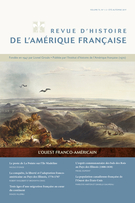La conquête, la liberté et l’adaptation franco-américaine au Pays des Illinois, 1778-1787
Main Article Content
Abstract
From the arrival of the first French fur traders and missionaries, the Illinois Country was defined by a series of cultural and political accommodations. When Virginian soldiers arrived at Kaskaskia in 1778, it marked a third imperial regime in the region in fifteen years. Much like they had done under the previous French and British regimes, French Creoles sought to assert political and cultural autonomy under American rule. This article considers the challenges that French Creoles faced in resisting emerging American hegemony in Illinois Country, and the strategies that they employed to adapt to new geopolitical circumstances during and after the American Revolution. A comparison of Creole claims and acts of resistance at Kaskaskia and Cahokia, and their surroundings, shows that they successfully asserted their rights and also set the foundation for a new Franco-American identity.
